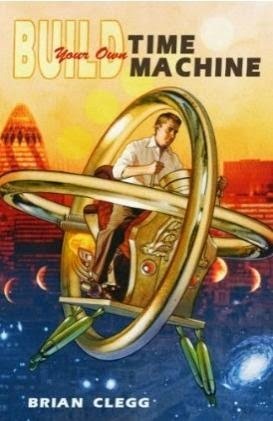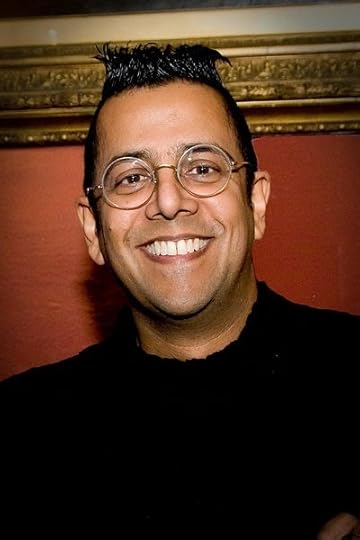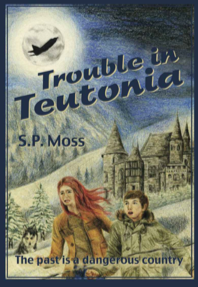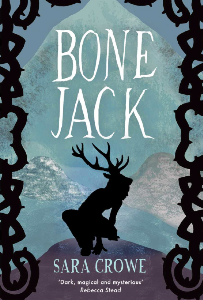Brian Clegg's Blog, page 98
April 23, 2014
Who should I vote for?
 I have a problem with the upcoming European elections - I don't know who to vote for, so I'm asking for your help. Not voting is not an option that I am prepared to consider - I value democracy too highly - but I struggle to be happy with any of the options.
I have a problem with the upcoming European elections - I don't know who to vote for, so I'm asking for your help. Not voting is not an option that I am prepared to consider - I value democracy too highly - but I struggle to be happy with any of the options.As a starting point I am a genuine floating voter. I change my allegiance from election to election - I don't understand the tribalism a lot of people exhibit when it comes to political parties, I just want the best option. If everything was even, I would probably vote Liberal Democrat as the broad feel of the party aligns best with my generally liberal orientation, but I have two big problems with their policies. These issues don't include, by the way, the business over tuition fees. Anyone who holds that against the LibDems is incredibly naive - you can't enter into a coalition and carry forward all you policies. To expect that to happen seems very silly. I wish they had been able to do away with tuition fees, but they weren't able to.
The two big issues for me with the LibDems are energy policy and Europe. On energy they have for so long been anti-nuclear, and that is just poor science*. I don't know the current policy in the hierarchy, but my suspicion is the majority of LibDems still don't understand why we should by now be getting a lot of our electricity from nuclear power. As for Europe, the LibDems were the only party wholeheartedly behind going into the Euro - we know what a disaster that would have been. More importantly now, they are just not critical enough of the European Union. While I accept the 'you can change more from the inside' argument, the EU is without doubt a ridiculously overinflated bureaucracy that interferes with far more than it should. And the European Parliament is not a real parliament - it really doesn't debate and alter legislation the way a parliament should. So given this is an EU election, I can't vote LibDem.
Looking at the list of candidates I will be voting for**, I can similarly dismiss the Greens for their opposition to nuclear power and general misunderstanding of environmental issues, putting knee-jerk emotional response over what is actually best for us. I find the Conservatives view on Europe too rabid, though I do like the idea of a referendum on Europe - the trouble is, my vote in the Euro elections has no influence on this. And anyway, I'd rather not vote for them on principle. My problem is rather different with Labour - I really don't understand their position on Europe. They may have a closer view to mine than most of the others, but I'm not clear they want to stand up for reducing European bureaucracy - they had over 10 years to attempt this and in that time did nothing. And then there is UKIP. (Groan.)
I can honestly say almost everything about UKIP makes me feel nauseous in the extreme. I don't make the mistake of thinking they are largely ultra-right wing bigots, a kind of BNP lite, because that's not a rational assessment. They are mostly older voters who are fed up with change, and I can understand that and don't think we should belittle them for it with terms like 'swivel-eyed' - I just think they are wrong. Admittedly I do enjoy the way they openly despise the EU bureaucracy (and can't help but smile at Mr Farage's rants in the European Parliament), but in the end, their approach is not the right way to get anything done. It is too negative and not constructive. And anyway, have you seen some of their candidates?
So there you have it. I want to vote, but I'm not sure there is anyone I can vote for. The only other party on the list is the 'English Democrats', which I knew nothing about before researching this post, but is apparently trying to be the English equivalent of the Scottish Nationlists/Plaid Cymru - but it also seems to be positioned well to the right of UKIP on the political spectrum despite claiming no left/right allegiance. This does not fill me with enthusiasm - in fact they even come below the Greens in my preferences. So I'm stuck. Help!
* [UPDATE] I have since noticed that the Lib-Dems became pro-nuclear last year - but I still can't forgive years of opposition.
** When I first wrote this piece I had no idea who my candidates were: thanks to Hayley Stevens for pointing out this website which, though still under construction, at least lists them.
Published on April 23, 2014 00:57
April 22, 2014
Glow in the dark CSI
 Many of us enjoy a good murder mystery, and at some point we're liable to come across a forensic scientist at work on the TV screen - in fact in shows like Waking the Dead and assorted CSIs, they have played a central role in the drama. Many of the tools and techniques used on screen are fictional but my latest Royal Society of Chemistry podcast covers a genuine CSI compound - luminol.
Many of us enjoy a good murder mystery, and at some point we're liable to come across a forensic scientist at work on the TV screen - in fact in shows like Waking the Dead and assorted CSIs, they have played a central role in the drama. Many of the tools and techniques used on screen are fictional but my latest Royal Society of Chemistry podcast covers a genuine CSI compound - luminol.To find out more about this glow in the dark blood detector, take a listen by clicking play on the bar at the top of the page - or if that doesn't work for you, pop over to its page on the RSC site.
Published on April 22, 2014 00:36
April 21, 2014
Could Cameron be right?
 I agree with Dave
I agree with Dave(sort of)I will be honest, this does not come easy to me, but I sort of agree with David Cameron about something. Don't get over-excited, I have not gone over to the dark side. George Osborne is still not on my Christmas card list. But I did get rather irritated about the flak Cameron received for daring to suggest that the UK is a Christian nation.
The critics point out that most of us aren't practising Christians, and this is true, but entirely misses the point. The enthusiasts for multiculturalism, no doubt the same ones who bemoan Cameron's remarks, are always quick to say that we ought to encourage everyone to cherish their cultural heritage, not to forget it. And to suggest that our cultural heritage in the UK is not Christian is perverse. Of course Cameron got it wrong in the detail. He should have said CofE not Christian as they aren't identical concepts, and that's what is central to our cultural heritage. And of course it isn't the same thing to be a 'Christian nation' and to 'have a Christian cultural heritage', so the wording wasn't perfect - even so, the attacks he has received would apply equally to the correct wording.
Don't get me wrong, I think that religion should have less part in many aspects of life than it does. I think there should not be religious schools, or bishops in the House of Lords purely as a result of their religious affiliation. I think the Church of England should be disestablished before the clearly non-Chrisitian Prince Charles becomes its nominal head. (For that matter I think we should get rid of our royalty before he becomes King, but that's a different story.) But I also think that it is important that we celebrate British culture just as much as any other - more so as we are, after all, living in Britain - and to pretend that Christianity is not not a significant part of that culture is blinkered and biased.
Image from 10 Downing Street website (http://www.number10.gov.uk/footer/cop...) via Wikipedia
Published on April 21, 2014 02:07
April 17, 2014
The first kiss thing
 Hollingworth Lake, not by moonlightThe other day I was on a train, and glancing over the lurid magazine of the person sitting next to me, saw the headline 'Do you remember your first kiss.' All of a sudden, just like one of those montagey bits in a Hollywood movie, I was plunging back in time, because indeed I do.
Hollingworth Lake, not by moonlightThe other day I was on a train, and glancing over the lurid magazine of the person sitting next to me, saw the headline 'Do you remember your first kiss.' All of a sudden, just like one of those montagey bits in a Hollywood movie, I was plunging back in time, because indeed I do.Like many geeky teenagers, to be honest I had very little experience of the opposite sex when 14 or 15, but age 11, before the confusions and complexities of secondary school, I did indeed have a girlfriend, Helen Margaret Shadforth. I only really have two memories of her. One is evoked by a little handwritten letter (they were back then) which clearly came when our grand age-11 passion was fading, as Helen says 'I don't suppose you want to go to the cinema, but if you do there is the new Dr Who film on at the Odeon.' Oh, fickle youth. But the outstanding flashbulb memory is the kiss.
Helen lived near to Hollingworth Lake, a local beauty spot near Littleborough in Lancashire where I was brought up. Technically a reservoir for the nearby canal, it is nonetheless a pleasant location. It was night time and the two of us walked around to the back of the lake. This was a non-trivial outing. We aren't talking a London-style boating lake, this thing is about a kilometre across. I'm not sure I'd ever been round the back of the lake - most of the activities took place at the front, but round the back was a rather lonely little playground.
We sat on a roundabout or swings or some such thing (come on, this is distant memory), and a big moon was out in a clear sky - or at least that's what my probably semi-fictional memory tells me, and there we kissed. I can't remember what I thought of this, because when we had wandered back, we were in terrible trouble for wandering off after dark on our own and this wiped out any details. But first kiss it was. And I just hope Helen remembers it still too.
Picture by I, Carelesshx from Wikipedia
Published on April 17, 2014 01:30
April 16, 2014
Why politics makes for bad ecologic
 I was interested to read a news report telling us that the IPCC's focus on cutting carbon emissions was ignoring the development needs of the poor. Apparently Dr Chukwumerije Okereke, from Reading University, said 'The argument has been shifting away from the view that the developed countries, who have been mainly responsible for the problem, should take leadership in solving it, to this centre-ground view that we are all in it together and we all have to do our share.' Dr Okereke thinks this is a bad thing, because those 'who have been mainly responsible' should shoulder their guilt and sort it out, leaving everyone else to do whatever they like. The trouble is, this attitude is all about politics and nothing to do with science and solutions.
I was interested to read a news report telling us that the IPCC's focus on cutting carbon emissions was ignoring the development needs of the poor. Apparently Dr Chukwumerije Okereke, from Reading University, said 'The argument has been shifting away from the view that the developed countries, who have been mainly responsible for the problem, should take leadership in solving it, to this centre-ground view that we are all in it together and we all have to do our share.' Dr Okereke thinks this is a bad thing, because those 'who have been mainly responsible' should shoulder their guilt and sort it out, leaving everyone else to do whatever they like. The trouble is, this attitude is all about politics and nothing to do with science and solutions.I have three problems with Dr Okereke's viewpoint.
It's a classic attempt to bring blame in - the developed countries, the argument goes, are most to blame for the current situation, and hence they should do most to fix it. However, as James Lovelock pointed out in his recent book A Rough Ride to the Future , blame is both counterproductive and wrong. It's a bit like blaming people in the 1930s for smoking so much and inflicting passive smoking on their children. They had no reason to do otherwise. Blame is irrelevant.This approach is backward looking. We can't undo what has been done in the past, but we can change what we do in the future, and that starts today (not in 2005 or 1825 or whenever). We do all have to do our share because we are all contributing to the increasing problem, and while some countries like the UK are reducing their contribution, many are not.Even out of pure self-interest, the developing nations need to do all they can. Just look at the way climate change is predicted to influence agriculture around the world. Which countries get hit worst? With the exception of Australia and the US, the majority are developing nations. Some Northern countries even get improvements in agricultural capability. Where is flooding going to have the worst impact? The Indian subcontinent. Which countries can least afford to mitigate the impact? The developing nations.The fact is that climate change is not something where we can afford to play politics and the blame game. It needs to be about realistic solutions. Many of these may be about adaptation, others are about slowing down the change. But we don't get anywhere by playing silly games.
This has been a green heretic production
Published on April 16, 2014 01:11
April 15, 2014
Who wrote the book?
 As, for obscure reasons, I am replacing Roy Hattersley at the Kempsford Literary Festival and talking about
Build Your Own Time Machine
(if you're interested it's in St Mary's Church, Kempsford, 4.30pm on Sunday 27 April, £5 - tickets from kemplitfest@gmail.com or on 01285 810588, or on the door), I thought I'd do a quick time travel related post here.
As, for obscure reasons, I am replacing Roy Hattersley at the Kempsford Literary Festival and talking about
Build Your Own Time Machine
(if you're interested it's in St Mary's Church, Kempsford, 4.30pm on Sunday 27 April, £5 - tickets from kemplitfest@gmail.com or on 01285 810588, or on the door), I thought I'd do a quick time travel related post here.As I describe in the book/talk, there is nothing in the laws of physics that prevents time travel, and relativity makes forwards time travel relativity simple. Backwards is a lot more tricky, but in principle this is possible using general relativity effects. But many physicists believe that it can never actually happen, in part because of the paradoxes that arise if you can travel into the past.
The best known time paradox is the so-called grandfather paradox, where you visit the past, kill a grandparent before you are born (I don't know why it's a grandparent, but it's traditional) and you're in a bit of a pickle. (Think about it.) But I prefer a rather more elegant and less bloody paradox.
Let's say I sent a copy of Build Your Time Machine back through a time machine to before I started to write it. Then, rather than bother to write the book, I just copy it out and send it off to my publishers. Who wrote the book, and when? The 'me' in the past didn't - he just copied out an existing book. And the 'me' in the future didn't - he just took a book of the shelf and put it into the time machine. Somehow, the book has sprung into existence from nowhere, fully formed.
Although many see this kind of thing as the death knell for backward time travel, others suggest that either it simply wouldn't happen - somehow nature would conspire to avoid my ever getting the book to myself in the past - or even that this is perfectly reasonable and explicable thanks to the the many worlds interpretation of quantum theory. In 'many worlds' every time there is a quantum event that could have more than one outcome, all possible outcomes occur in different universes, making the 'reality' we experience merely one path through a near-infinite tree of universes.
If such an interpretation is true (there is, as yet, no good evidence either way), then it is possible to get around time paradoxes by assuming that the 'original' and 'post time travel' versions involve crossing between different many worlds universes. So I still wrote the book - but it is a different me in a different universe who did so, and the 'me' in this universe really does get a book without any effort.
Mind boggling? Absolutely. But fun to think about.
Published on April 15, 2014 03:10
April 14, 2014
Let's hear it for Chiropractic Awareness Week
 Could you sue this man?
Could you sue this man? I mean, look at that smile!Yes, folks, it's Chiropractic Awareness week, that time of year when we are all asked to give a thought to our local chiropractors and their chiropractices. And what better chiropractic activity to give some thought to than the British Chiropractic Association's (BCA) legal attack on Simon Singh.
In case you don't remember, back in 2008, around this time of year, Singh, one of the UK's leading popular science writers, contributed a piece to the Guardian entitled Beware the spinal trap. In it he described the odd origins of chiropractic and the assorted ailments that have been claimed to be cured by this spinal manipulation, including 'children with colic, sleeping and feeding problems, frequent ear infections, asthma and prolonged crying'. Singh asserted that the BCA ' is the respectable face of the chiropractic profession and yet it happily promotes bogus treatments.'
He then described the various proper clinical trials that have been done in terms of whether or not chiropractic produced the benefits concerned, and also described the studies that have showed adverse side effects - some very serious - some have suffered as a result of being a chiropractic patient.
Singh ended up with the telling remark 'Bearing all of this in mind, I will leave you with one message for Chiropractic Awareness Week - if spinal manipulation were a drug with such serious adverse effects and so little demonstrable benefit, then it would almost certainly have been taken off the market.'
As a result of Singh's use of the word 'bogus', the BCA made a legal complaint that resulted in a two year lawsuit. In the end Singh was vindicated - but he lost two years of his working life in this process and went through a very painful experience.
As a result of the judgements received, the BCA withdrew its libel action against Singh, and his original article was reinstated in all its glory: you can read it here, and treasure the wonder of free speech.
So there we have it, for Chiropractic Awareness Week. I trust that anyone who decides to make use of a chiropractor reads Singh's article first. Because there is certainly some material there that is worthy of serious thought.
Image by Richardc39 from Wikipedia
Published on April 14, 2014 01:59
April 12, 2014
Do you know yourself?
A friend of mine is doing PhD research on personality and needs some volunteers to fill in two online questionnaires. They do take 15 to 25 minutes each, but you would be contributing to valuable research. He is researching the extent to which an individual displays seemingly opposite qualities in different contexts e.g. can somebody be both “introverted” and “extraverted” – or can they be “tough” and “compassionate”. His PhD is looking to refute traditional “type theory” that likes to make you exclusively one (and not the other). He is also researching how using opposite qualities may boost an individual’s “emotional intelligence”.After he has analysed the data, he will email out a short personality report based on the 1st questionnaire and a short emotional intelligence report based on the 1st & 2nd questionnaire combined, so you get some feedback about yourself.If anyone could help it would be great. These are the surveys - you do need to do both.This is the first surveyThis is the second survey
Published on April 12, 2014 03:40
April 11, 2014
Sequel or prequel?
 Purely by coincidence I have two posts about young adult fiction in a row, though this is quite different, as I am delighted to welcome author S. P. Moss to describe a strange aspect of time in her latest novel:
Purely by coincidence I have two posts about young adult fiction in a row, though this is quite different, as I am delighted to welcome author S. P. Moss to describe a strange aspect of time in her latest novel:‘… you see, Grandpop, this has happened once before, or I suppose I mean after...’
One man’s past is another man’s future. This was the conundrum facing me when I came to write the sequel – or is it a prequel? – to the children’s adventure story, The Bother in Burmeon .
The Bother in Burmeon is a retro-style tale. Young Billy slips back in time to 1962 to join his RAF pilot granddad in a rip-roaring jungle adventure. But what on earth is going to happen if, a few months later, Billy takes another time trip? – As he does in the new book, Trouble in Teutonia . He ends up in a country not dissimilar to Germany - in the middle of a Cold War winter, in 1957.
It’s “after” for Billy. But it's “before” for Grandpop. This leads to all manner of dilemmas for the twelve-year-old. Can he spill the beans about what will happen in the future, or is that just not cricket? Are the events he has experienced in 1962 pre-destined to take place, or has he just messed up the future? And what is the nature of time?
On this last question, Billy has some hair-raising lessons from the eccentric Professor Brian Blunderby, a breeder of fox terriers, designer of jet fighters and dabbler in matters of space and time. The inspiration for Prof Blunderby was J. W. Dunne, aeronautical engineer and author of An Experiment with Time (1927). Dunne proposed the notion of “serial time”, in which past, present and future are present simultaneously. But normal human perception is only capable of experiencing time in a linear, unidirectional fashion.
I came across Dunne via a connection that might, on first sight, seem curious: John Buchan. Now, I freely admit that John Buchan has been a huge influence on all the derring-do in my stories, but – philosophical questions of time and consciousness? Well, in Buchan’s Dunne-influenced novel The Gap in the Curtain (1932) a professor conducts an experiment on precognition at a country house party. The participants are shown a copy of The Times, a year on. Is their destiny pre-ordained, or can they change the course of events?
Which brings us back to my dilemma. Prequel or sequel? Maybe, in the same way that Dunne believed all time was eternally present, a story can be both before and after. Which makes Trouble in Teutonia neither prequel nor sequel, but a sprequel.
Trouble in Teutonia will be launched on Thursday, 17th April, at Brooklands Museum, Weybridge, Surrey.
For more information, please see www.circaidygregory.co.uk and www.troubleinteutonia.com
Published on April 11, 2014 02:35
April 9, 2014
Bone Jack review
 I have been a huge fan of British fantasy writer Alan Garner since I was 11. I went to the same school as Garner, and all the locations of his earlier books were extremely familiar to me - which made the books extra special because a sense of place is central to Garner's superb fantasies. I stayed with him until what was, for me, his best book The Owl Service, after which we parted company as Garner's writing headed into a more confused place.
I have been a huge fan of British fantasy writer Alan Garner since I was 11. I went to the same school as Garner, and all the locations of his earlier books were extremely familiar to me - which made the books extra special because a sense of place is central to Garner's superb fantasies. I stayed with him until what was, for me, his best book The Owl Service, after which we parted company as Garner's writing headed into a more confused place.Since reading Garner I have come to enjoy other fantasy writers - notably Gene Wolfe and Neil Gaiman - whose real world fantasies are far better than pure sword and sorcery because their locations, myth and legend, whether existent or conjured up for the book, intertwine with the lives of ordinary people in a world we know and understand, making the stories much more powerful.
What Sara Crowe has done with Bone Jack is remarkable - she has brought back the intensity of reading Garner. While entirely its own book, and not a pastiche, I felt that same sense of real connection with the landscape, and the dread of the kind of dark fantasy that teenagers understand but adults tend to forget. This is pitched pretty much at the same level as Garner's Elidor - more sophisticated and knowing than his Alderly Edge books, but without the adult connotations of The Owl Service.
It would be an understatement to say I loved it - it was my teen reading recaptured. There isn't an awful lot of 'young adult' fiction I enjoy. I'm generally happy to leave it to its target audience. But Bone Jack hit me fair and square between the eyes.
If I am going to be really picky, I thought Ash's father's problems felt a little engineered to isolate the main character, rather than working as a true part of the plot. I also felt Bone Jack was underused. But those are tiny writers' points that really don't signify much at all.
If you, or a teen you know, likes the kind of fantasy that is tied up with dark legends, blood and the land - but not so dark that the main character can't win through - then you are going to love this book. Run, don't walk to Amazon.co.uk and click up a storm. (It isn't on Amazon.com for technical reasons, but you can still order it in the US from here.)
Published on April 09, 2014 01:01



